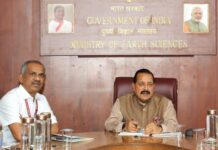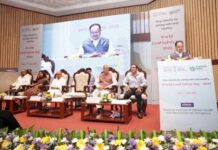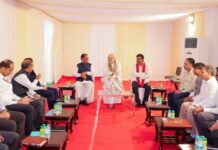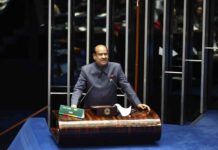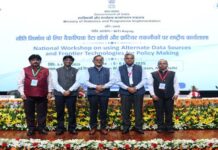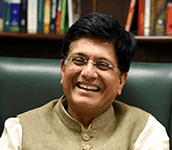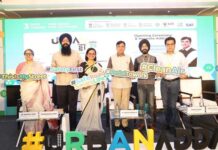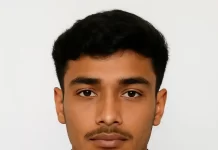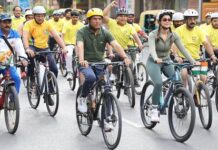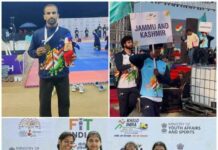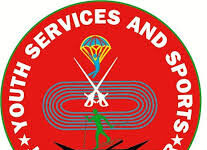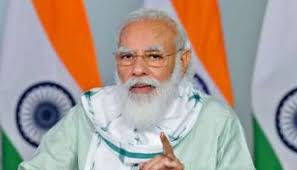27 NOV , Delhi: My dear countrymen, Namaskar.
I extend a warm welcome to you all in ‘Mann Ki Baat’, once again. This programmme is the 95th episode. We are fast moving towards the century of ‘Mann Ki Baat’. This programmme is another medium for me to connect with a 130 crore countrymen. Before every episode, reading letters from villages and cities, listening to audio messages from children to elders; it is like a spiritual experience for me.
Friends, I want to start today’s program referring to a unique gift. There is a weaver brother in Rajanna Sircilla district of Telangana – YeldhiHariprasad Garu. He has sent me this G-20 logo woven with his own hands. I was surprised to see this wonderful gift. Hariprasad ji is such an expert in his art that he attracts everyone’s attention. Hariprasad ji has also sent me a letter along with this hand-woven G-20 logo. In this he has written that it is a matter of great pride for India to host the G-20 summit next year. Amid the joy of this achievement of the country, he has prepared this logo of G-20 with his own hands. He has inherited this wonderful talent of weaving from his father and today he is engaged in it with full passion.
Friends, a few days ago I had the privilege of launching the G-20 logo and the website of the Presidency of India. This logo was chosen through a public contest. When I received this gift sent by Hariprasad Garu, another thought came to my mind. I was very happy to see how connected even a person sitting in a district of Telangana could feel with a summit like G-20. Today, many people like Hariprasad Garu have sent letters to me saying that their hearts have swelled with pride at the country hosting such a big summit. I will also mention to you the message of Subba Rao Chillara ji from Pune and Tushar Jagmohan from Kolkata. They have highly appreciated India’s pro-active efforts regarding G-20.
Friends, the G-20 has a partnership comprising two-thirds of the world’s population, three-fourths of world trade, and 85% of world GDP. You can imagine – India is going to preside over such a big group, such a powerful group, 3 days from now i.e. from the 1st of December. What a great opportunity has come for India, for every Indian! This becomes even more special because India was awarded this responsibility during Azadi Ka Amrit Kaal .
Friends, the Presidency of G-20 has arrived as a big opportunity for us. We have to make full use of this opportunity and focus on Global Good, world welfare. Whether it is peace or unity, sensitivity towards the environment, or sustainable development, India has solutions to challenges related to these. The theme that we have given “One Earth, One Family, One Future” shows our commitment to Vasudhaiva Kutumbakam. We always say –
Om Sarvesham Swastirbhavatu.
Sarvesham Shanti Bhavatu.
Sarvesham Purnambhavatu.
Sarvesham Mangalambhavatu.
Om Shanti: Shanti: Shanti: ॥
That is, there should be welfare of all, peace to all, fulfillment to all and well being for all. In the coming days, many programs related to G-20 will be organized in different parts of the country. During this period, people from different parts of the world will get a chance to visit your states. I am sure that you will bring the diverse and distinctive colors of your culture to the world and you also have to remember that the people coming to the G-20, even if they come now as delegates, are tourists of the future. I urge all of you, especially my young friends on one more thing. Like Hariprasad Garu, you too must join the G-20 in one way or the other. The Indian logo of G-20 can be made, can be printed, in a very cool way, in a stylish way, on clothes. I would also urge schools, colleges and universities to create opportunities for discussions, debates and competitions related to G-20 in their respective places. If you go to the G20.in website, you will find many things there according to your interest.
My dear countrymen, on the 18th of November, the whole country witnessed new history being made in the space sector. On this day, India sent its first such rocket into space, which was designed and prepared by the private sector of India. The name of this rocket is – ‘Vikram-S’. As soon as this first rocket of the indigenous Space Start-up made a historic flight from Sriharikota, the heart of every Indian swelled with pride.
Friends, ‘Vikram-S’ Rocket is equipped with many features. It is also lighter than other rockets, and also cheaper. Its development cost is much less than the cost incurred by other countries involved in space missions. In space technology, World class standard at a low cost, has now become the hallmark of India. Another modern technology has been used in making this rocket. You will be surprised to know that some crucial parts of this rocket have been made through 3D Printing. Surely, the name ‘Prarambh’ given to the launch mission of ‘Vikram-S’, suits it perfectly. This marks the dawn of a new era for the private space sector in India. This is the beginning of a new era full of self-confidence for the country. You can imagine the children who once made paper airplanes and used to fly them with their hands are now getting a chance to make airplanes in India itself. You can imagine those children who once used to draw shapes in the sky, looking at the moon and stars, are now getting a chance to make rockets in India itself. After space was opened to the private sector, these dreams of the youth are also coming true. As if these youth making rockets are saying, Sky is not the limit.
Friends, India is sharing its success in the space sector with its neighbouring countries as well. Just yesterday, India launched a satellite, which has been jointly developed by India and Bhutan. This satellite will send pictures of very good resolution which will help Bhutan in the management of its natural resources. The launching of this satellite is a reflection of the strong Indo-Bhutan relations.
Friends, you must have noticed that in the last few episodes of ‘Mann Ki Baat’, we discussed a lot on Space, Tech, Innovation. There are two special reasons for this: one is that our youth are doing wonderful work in this field. They are thinking Big and Achieving Big. Now they are not going to be satisfied with small achievements. Secondly, in this exciting journey of innovation and value creation, they are also encouraging their other young colleagues and start-ups.
Friends, when we are talking about innovations related to technology, how can we forget drones? India is also moving fast in the field of drones. A few days ago we saw how apples were transported through drones in Kinnaur, Himachal Pradesh. Kinnaur is a remote district of Himachal and there is heavy snowfall in this season. With this much snowfall, Kinnaur’s connectivity with the rest of the state becomes very difficult for weeks. In such a situation, the transportation of apples from there is equally difficult. Now with the help of Drone Technology, delicious Kinnauri apples of Himachal will start reaching people more quickly. This will reduce the expenditure of our farmer brothers and sisters – apples will reach the market on time, there will be less wastage of apples.
Friends, Today our countrymen are making things possible with their innovations, which could not even be imagined earlier. Who would not be happy to see this? In recent years, our country has undertaken a long journey of achievements. I have full faith that we Indians and especially our young generation are not going to stop now.
Dear countrymen, I am going to play a small clip for you..
All of you must have heard this song sometime or the other. After all, this is Bapu’sfavorite song, but if I tell you that the singers who have sung it are from Greece, you will definitely be surprised! And this will also fill you with pride. This song has been sung by the singer from Greece – ‘Konstantinos Kalaitzis’. He had sung it during the 150th birth anniversary celebrations of Gandhiji. But today I am discussing him for some other reason. He has a great passion for India and Indian music. He has so much affection for India, that in the last 42 (forty two) years he has come to India almost every year. He has studied about the origin of Indian music, different Indian musical systems, different types of ragas, talas and rasas as well as different gharanas. He has studied the contribution of many great personalities of Indian music; he has also closely understood the different aspects of classical dances of India. Now he has put together all these experiences related to India very beautifully in a book. There are about 760 pictures in his book named Indian Music. Most of these photographs have been taken by he himself. Such enthusiasm and fascination for Indian culture in other countries is really heartening.
Friends, a few weeks ago another news came which is going to fill us with pride. You will be pleased to know that in the last 8 years the export of musical instruments from India has increased three and a half times. Talking about Electrical Musical Instruments; their export has increased 60 times. This shows that the craze for Indian culture and music is increasing all over the world. The biggest buyers of Indian Musical Instruments are developed countries like USA, Germany, France, Japan and UK. It is a matter of fortune for all of us that our country has such a rich heritage of Music, Dance and Art.
Friends, we all know the great sage poet Bhartrihari for his ‘Niti Shatak’. In one of the verses he says that one’s attachment to art, music and literature is the real identity of humanity. In fact, our culture takes it above Humanity, to Divinity. In the Vedas, Samaveda has been called the source of our diverse music. Be it the Veena of Maa Saraswati, the flute of Bhagwan Krishna, or the Damru of Bholenath, our Gods and Goddesses are also attached with music. We Indians find music in everything. Be it the murmur of a river, the raindrops, the chirping of birds or the resonating sound of the wind, music is present everywhere in our civilization. This music relaxes not only the body, but also gives joy to the mind. Music also connects our society. If Bhangra and Lavani have a sense of fervor and joy, Rabindra Sangeet lifts our souls. Tribals across the country have different musical traditions. They inspire us to live in harmony with each other and with nature.
Friends, Our forms of music have not only enriched our culture, but have also left an indelible mark on the music of the world. The fame of Indian music has spread to every corner of the world. Let me play to you one more audio clip.
You must be thinking that bhajan kirtan is being performed in some temple in the neighbourhood. But these notes have reached you from Guyana, a South American country thousands of miles away from India. In the 19th and 20th centuries, a large number of people from here went to Guyana. They also took many traditions of India with them from here. For example, as we celebrate Holi in India, in Guyana also the colors of Holi come alive with zest. Where there are colors of Holi, there is also the music of Phagwa that is Phagua. In Phagwa of Guyana there is a special tradition of singing wedding songs associated with Bhagwan Rama and Bhagwan Krishna. These songs are called Chautal. They are sung on the similar type of tune and at a high pitch as we do here. Not only this, Chautal Competitions are also held in Guyana. Similarly, many Indians, especially people from eastern Uttar Pradesh and Bihar, had gone to Fiji too. They used to sing traditional bhajan-kirtans, mainly couplets from the Ramcharitmanas. They also formed many Mandalis associated with bhajan-kirtan in Fiji. Even today there are more than two thousand Bhajan-Kirtan Mandalis in Fiji by the name of Ramayana Mandali. Today they can be seen in every village and locality.
I have given only a few examples here. If you see in the whole world, then this list of lovers of Indian music is very long.
My dear countrymen, we all always take pride in the fact that our country is home to the oldest traditions in the world. Therefore, it is also our responsibility to preserve our traditions and traditional knowledge, to promote it and to take it forward as much as possible. One such commendable effort is being made by some friends of our northeastern state of Nagaland. I liked this effort very much, so I thought, I’d share it with the listeners of ‘Mann Ki Baat’.
Friends, the lifestyle of the Naga community in Nagaland, their art-culture and music attracts everyone. It is an important part of the glorious heritage of our country. The life of the people of Nagaland and their skills are also very important for a sustainable life style. In order to save these traditions and skills and pass them on to the next generation, the people there have formed an organization, that’s name is ‘Lidi-Cro-U’. ‘ The organization has undertaken the work of reviving beautiful facets of Naga culture which were on the verge of being lost. For example, Naga folk music is a very rich genre in itself. This organization has started the work of launching Naga Music Albums. So far, three such albums have been launched. These people also organize workshops related to folk music and folk dance. Youth are also given training for all these. Not only this, the youth are also trained in the traditional Nagaland style of apparel making, tailoring and weaving. Many types of products are made from bamboo in the Northeast. The youth of the new generation are also taught to make bamboo products. With this, these youth not only get connected with their culture, but also create new employment opportunities for them. People at Lidi-Cro-U try to make more and more people know about Naga folk-culture.
Friends, there will be such cultural styles and traditions in your region too. You too can make such efforts in your respective areas. If you are aware of any such unique effort being made somewhere, then you must share that information with me as well.
My dear countrymen, we it has been said here –
Vidyadhanam Sarva Dhanam Pradhanam
That is, if someone is donating knowledge, then he is doing the noblest work in the interest of the society. Even a small lamp lit in the field of education can illuminate the whole society. It gives me great pleasure to see that many such efforts are being made across the country today. Bansa is a village in Hardoi, 70-80 kilometres away from Lucknow, the capital of UP. I have come to know about Jatin Lalit Singh ji of this village, who is engaged in kindling the flame of education. Jatin ji had started a ‘Community Library and Resource Centre’ here two years ago.
, His centre has more than 3000 books related to Hindi and English literature, computer, law and preparing for many government exams. In this library, the choice of the children has also been taken full care of. Whether it is comic books or educational toys present here, children are very fond of them. Small children come here to learn new things while playing. Be it offline or online education, about 40 volunteers are busy guiding the students at this center. Everyday about 80 students of the village come to study in this library.
Friends, Sanjay Kashyap ji of Jharkhand is also giving new wings to the dreams of poor children. In his student life, Sanjay ji had to face the paucity of good books. In such a situation, he decided that, he would not let the future of the children of his region be dark, due to lack of books. Because of this mission, today he has become the ‘Library Man’ for children in many districts of Jharkhand. When Sanjay ji had started working, he had got the first library built at his native place. Wherever he was transferred during his job, he would get involved in the mission of opening a library for the education of poor and tribal children. While doing this, he has opened libraries for children in many districts of Jharkhand. His mission to open a library is taking the form of a social movement today. Be it Sanjay ji or Jatin ji, I especially appreciate them for their myriad such efforts.
My dear countrymen, the world of medical science has made a lot of progress with the help of research and innovation as well as state-of-the-art technology and equipment, but some diseases, even today, remain a big challenge for us. One such disease is – Muscular Dystrophy! It is mainly a genetic disease that can occur at any age, in which the muscles of the body begin to weaken. It becomes difficult for the patient to do even his small tasks of daily life. The treatment and care of such patients require great sense of service. We have such a centre at Solan in Himachal Pradesh, which has become a new ray of hope for the patients of Muscular Dystrophy. The name of this centre is ‘Manav Mandir’; it is being run by the Indian Association of Muscular Dystrophy. Manav Mandir is a wonderful example of human service true to its name. OPD and admission services for the patients started here three-four years ago. Manav Mandir also has the facility of beds for about 50 patients. Along with Physiotherapy, Electrotherapy, and Hydrotherapy, diseases are also treated here with the help of Yoga-Pranayama.
Friends, through all kinds of hi-tech facilities, this centre also tries to bring a positive change in the lives of the patients. A challenge associated with Muscular Dystrophy is also a lack of awareness about it. That’s why, this centre organizes awareness camps for patients not only in Himachal Pradesh but across the country. The most encouraging thing is that the management of this organization is mainly done by people suffering from this disease, like social worker, Urmila Baldi ji, President of Indian Association Of Muscular Dystrophy Sister Sanjana Goyal ji, and other members of this association. Shriman Vipul Goyal ji, who played an important role in the formation, is playing a very important role for this institution. Efforts are also on to develop Manav Mandir as a hospital and research centre. With this, patients will be able to get better treatment here. I heartily appreciate all the people trying in this direction, as well as wish the best for recovery of all the people suffering from Muscular Dystrophy.
My dear countrymen, the creative and social endeavours of the countrymen that we discussed in today’s ‘Mann Ki Baat’ are examples of the country’s energy and enthusiasm. Today every countryman is trying to do something different for the country in one field or the other, at every level. In today’s discussion itself, we saw that in an international event like G-20, one of our weaver companions understood his responsibility and came forward to fulfil it. Similarly, some are making efforts for the environment, others are working for water; many people are doing extraordinary work… from education, medicine and science technology to culture-traditions. This is because, today every citizen of ours is realising one’s duties. When such a sense of duty rises within the citizens of a nation, its golden future is automatically ensured, and, in the golden future of the country itself, also lies for all of us, a golden future.
I once again salute the countrymen for their efforts. We will meet again next month and will definitely talk about many more such encouraging topics. Do keep sending your suggestions and ideas. Many thanks to all of you!






